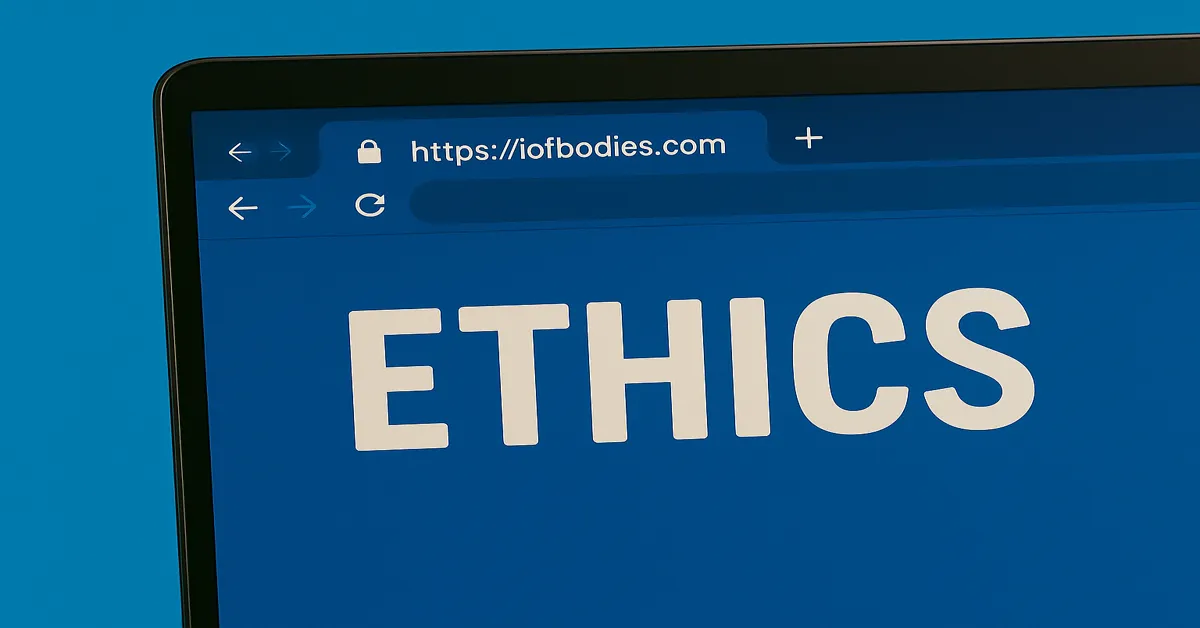In an age where digital existence is as consequential as physical presence, iofbodies.com ethics offers a lens into one of the most urgent and complex moral frontiers—how we define, protect, and respect identity in a world mediated by code. The phrase encapsulates the ethical framework around digital embodiment, the responsibility of creators and platforms in preserving autonomy, and the emerging culture of data stewardship. If you’ve found yourself wondering what it means to own your image, your likeness, or your data online—particularly in environments designed to blur boundaries between self and system—then this conversation on iofbodies.com ethics is not just relevant, it’s critical.
1. What is iofbodies.com?
Before diving into its ethical dimensions, let’s establish a conceptual understanding. iofbodies.com is not just a domain or platform—it’s a philosophical proposition. The name suggests “Internet of Bodies” (IoB), an evolution of the Internet of Things (IoT), where human bodies are increasingly integrated with and interpreted through data systems. It explores how our physicality is rendered into digital artifacts: biometric data, avatars, social media personas, genetic information, and behavioral analytics.
This site—real or metaphorical—functions as a commentary space for how technology intertwines with embodiment, consent, surveillance, and agency. Think of it less as a static website and more as a critical arena for examining the moral negotiations surrounding digital life.
2. The Searcher’s Intent: Understanding Digital Ethics at Scale
At the heart of the query “iofbodies.com ethics” is a question of how we protect what makes us human in the face of rapidly evolving technologies. Users want to understand:
- What ethical principles guide the handling of digital bodies?
- How are consent and autonomy preserved in datafied environments?
- What are the responsibilities of tech companies when dealing with biometric or identity data?
- How do users reclaim agency over their online presence?
These questions are not theoretical—they are practical, urgent, and deeply personal.
3. Digital Embodiment and the New Moral Landscape
Our bodies now exist in pixels and databases. Fitness apps monitor our heart rates, facial recognition systems identify us in public spaces, and virtual assistants catalog our voices. This phenomenon—being present but digital—presents a radical shift in ethical responsibility.
Where traditional ethics dealt with the body as a material, locatable entity, iofbodies.com ethics deals with the fragmented body: one that is distributed across servers, apps, and sensors. This fragmentation complicates notions of consent and control.
Imagine your biometric data being sold to insurers, or your voice being used to train a language model without your consent. These aren’t hypotheticals—they are real-world dilemmas today. The ethics of iofbodies.com, therefore, emphasize:
- Informed Consent: Beyond a checkbox—truly understanding how data is used.
- Agency Over Representation: Who decides how your digital self is used?
- Right to Be Forgotten: Can you delete a digital body as you can walk away in real life?
4. The Consent Paradox in the Age of AI
One of the most troubling ethical issues raised at iofbodies.com is the consent paradox. Many platforms operate on opaque terms of service, where users unknowingly sign away rights. This becomes even more problematic when AI systems scrape and repurpose personal content—from social media posts to biometric signals—for training algorithms.
Consider this: your selfie today could be training tomorrow’s facial recognition system. Did you consent to that?
Ethical implication: Consent must evolve from a legalistic checkbox to a continuous, dynamic, and revocable process. That means real-time notification, opt-outs, and the ability to trace where your digital body exists.
5. Data Dignity: Rehumanizing the Digital Self
The term data dignity, central to iofbodies.com ethics, reframes data as not a resource to be mined, but a representation of personhood. This changes everything.
In the current paradigm, your digital behaviors—what you like, where you go, how you speak—are sold to advertisers. Under data dignity, these are treated with the same reverence as physical boundaries.
Core principles include:
- Reciprocity: If your data is used, you should benefit.
- Ownership: You should have control over deletion, modification, and sharing.
- Identity Anchoring: Data should not be dissociated from the context that gives it meaning.
6. Algorithmic Responsibility and the Digital Mirror
AI models, especially those built on large datasets, frequently reproduce and amplify existing biases. If our digital selves are trained into systems that label, sort, and gatekeep, ethics demand we examine:
- Who builds the model?
- Whose data is used?
- Who is excluded?
Iofbodies.com ethics argues for algorithmic transparency and auditable AI—systems that can explain how decisions are made and who they affect. Facial recognition that misidentifies darker-skinned individuals, or recommendation systems that reinforce gender stereotypes, are not mere bugs—they are ethical failures.
7. Surveillance Capitalism and the Marketization of Identity
Much of today’s digital embodiment exists in service to commerce. Our digital bodies are monetized through surveillance capitalism, where identity becomes a vector for profit. This raises major ethical concerns:
- Can a human identity be bought and sold?
- What safeguards exist to prevent exploitation?
- Who profits from our data existence—and at what cost?
The ethics championed by iofbodies.com push back against this model. They advocate for non-extractive tech—platforms that center human dignity over revenue.
8. Children, Digital Futures, and Consent That Cannot Be Given
When children are born into digital life—often documented from their first breath—the question of vulnerable embodiment arises. They cannot consent, yet their lives are permanently encoded online.
Iofbodies.com ethics demand intergenerational responsibility: how do we protect future identities? It includes:
- Default anonymization of minors.
- Time-bound data visibility.
- Ethical parenting in digital spaces.
9. The Role of Designers, Developers, and Policy Makers
Ethical accountability isn’t limited to users. Developers and designers are moral agents, responsible for anticipating harm. Features are not neutral—defaults shape behavior. A dark pattern that nudges users into sharing data is an ethical choice, not a design accident.
Policy also plays a vital role. As governments catch up to the pace of innovation, iofbodies.com ethics offers these regulatory pillars:
- Digital Rights Charters: Legal recognition of digital personhood.
- Audit Requirements: Public disclosure of how data is used.
- Restorative Mechanisms: Paths for redress when harm occurs.
10. Philosophical Undercurrents: What is a Body?
At its most radical, iofbodies.com ethics reopens an old philosophical question: what is a body? Is it flesh and blood, or is it pattern and presence? Can identity be contained within a frame, or does it leak across the web, reconstructing itself in every interaction?
This ambiguity is fertile ground for ethics. Because the more porous the self becomes, the more crucial our defenses must be.
11. Cultural Relativism and Digital Pluralism
The ethics of digital embodiment must also be culturally sensitive. What constitutes violation in one culture may be normalized in another. For example:
- Modesty norms vary across cultures—how does this affect avatar creation?
- The idea of collective data (tribal DNA, linguistic archives) clashes with individualist data ownership models.
Iofbodies.com ethics therefore promote pluralism: ethical systems that adapt to cultural contexts while upholding a universal baseline of dignity.
12. The Rise of Deepfakes and Identity Manipulation
The advent of deepfake technologies—AI-generated media that impersonates real individuals—poses new ethical threats. Imagine your face in a video you never made, speaking words you never said.
This distorts not just reality but reputation, trust, and emotional safety. Iofbodies.com ethics calls for:
- Legal protections against unauthorized synthetic media.
- Authentication standards for real content.
- Platforms to label manipulated content clearly.
13. Education and Ethical Literacy in a Data-Driven Society
Perhaps the most long-term solution is digital ethics literacy. Users need to understand how their data becomes a body—and how to protect it. Schools, workplaces, and public institutions must embed this literacy as foundational.
Key topics include:
- How platforms monetize behavior.
- What digital consent means.
- How to read privacy policies.
- How to challenge unethical tech.
14. Towards a Code of Digital Embodiment
The culmination of these discussions is the need for a Code of Digital Embodiment, akin to medical ethics in the analog world. This code would include principles like:
- Do No Harm to digital identity.
- Respect for Digital Autonomy.
- Equity in Algorithmic Design.
- Transparency and Accountability at all stages of data handling.
15. iofbodies.com Ethics in Practice: Imagining a Better Digital Future
What would a truly ethical digital world look like?
- Platforms would default to minimal data collection.
- Users would receive dividends when their data trains AI.
- Avatars would be co-designed with cultural sensitivity.
- Children’s data would expire unless re-consented upon adulthood.
- Digital bodies would have the right to rest, to silence, and to context.
These aren’t fantasies—they are the logical outcomes of ethical design.
Final Thoughts: Ethics as the Soul of the System
At the core of iofbodies.com ethics is a simple but profound belief: human dignity must be preserved, even when the human is digital. Our fragmented selves deserve care. Our virtual footprints deserve justice. And our future identities deserve design that puts morality, not monetization, at its center.
The digital world is still being built. The ethics of iofbodies.com remind us we are not just users—we are its authors. The future is embodied. The question is: will it be ethical?
Read: Syair HK: Unraveling the Tradition of Poetic Prediction in a Modern World
FAQs
1. What does “iofbodies.com ethics” mean?
The term refers to the ethical principles and debates surrounding digital embodiment—the representation and treatment of human identity in digital systems. It explores how bodies are translated into data, how consent is managed online, and what responsibilities platforms and developers have in protecting the dignity, privacy, and autonomy of users in a connected world.
2. Why is digital embodiment an ethical issue?
Because our digital representations—images, behaviors, biometrics—can be stored, analyzed, shared, and exploited without meaningful consent. Unlike the physical world, where we can walk away, digital bodies are persistent. Ethics demands we ask: Who controls your digital self? Who profits from it? Can you erase it?
3. How can users protect their digital identities?
Users can protect their digital selves by practicing strong privacy hygiene: read terms of service, adjust platform settings, opt out of data sharing when possible, and stay informed about how their data is used. More broadly, advocating for policy change and supporting ethical tech initiatives help build systems that protect everyone.
4. What role do tech companies play in iofbodies.com ethics?
Tech companies have immense responsibility. They design the systems that collect and process digital bodies. Ethical obligations include transparent data use, respecting consent, preventing algorithmic bias, and building tools that protect user autonomy—not exploit it. Design decisions are moral decisions.
5. Are there any laws protecting digital bodies?
Yes, but they vary by country and are often outdated. Regulations like the EU’s GDPR offer some protections, such as the right to access and delete personal data. However, laws have yet to fully address issues like biometric ownership, AI manipulation, or digital identity theft—areas central to iofbodies.com ethics.











